英文介绍日语
- 格式:pptx
- 大小:264.60 KB
- 文档页数:8
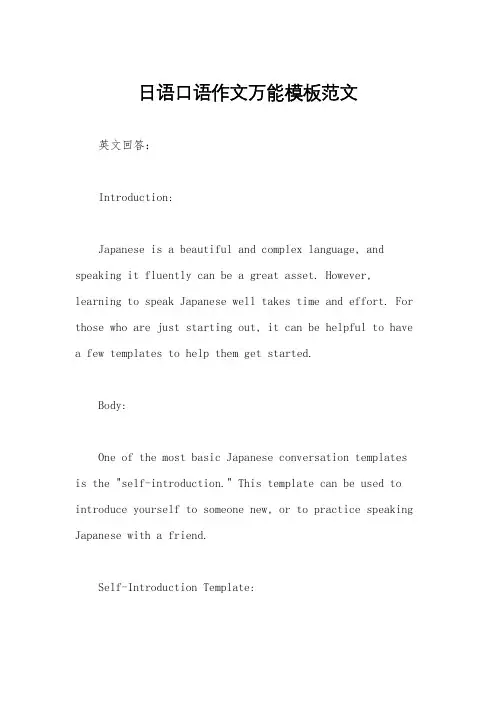
日语口语作文万能模板范文英文回答:Introduction:Japanese is a beautiful and complex language, and speaking it fluently can be a great asset. However, learning to speak Japanese well takes time and effort. For those who are just starting out, it can be helpful to have a few templates to help them get started.Body:One of the most basic Japanese conversation templates is the "self-introduction." This template can be used to introduce yourself to someone new, or to practice speaking Japanese with a friend.Self-Introduction Template:Hajimemashite. Watashi wa [あなたの名前] desu. (Nice to meet you. My name is [your name].)。
[あなたの出身地] kara kimashita. (I come from [your hometown].)。
[あなたの職業] desu. (I am a [your profession].)。
Yoroshiku onegai shimasu. (Please take care of me.)。
Here is an example of how to use this template:English: Nice to meet you. My name is John Smith. I come from New York. I am a teacher. Please take care of me.Japanese: Hajimemashite. Watashi wa John Smith desu. New York kara kimashita. Sensei desu. Yoroshiku onegai shimasu.Another common conversation template is the "thank you" template. This template can be used to express your gratitude to someone for something they have done for you.Thank You Template:Arigatou gozaimasu. (Thank you.)。
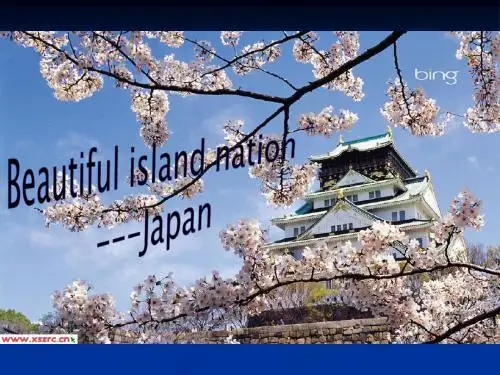
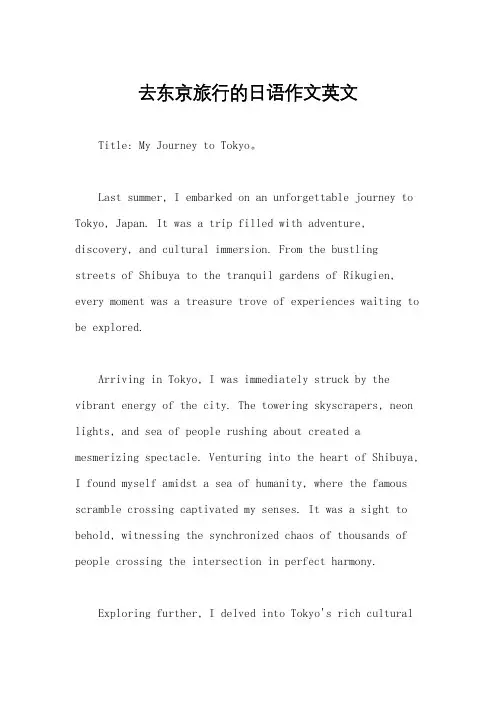
去东京旅行的日语作文英文Title: My Journey to Tokyo。
Last summer, I embarked on an unforgettable journey to Tokyo, Japan. It was a trip filled with adventure, discovery, and cultural immersion. From the bustlingstreets of Shibuya to the tranquil gardens of Rikugien, every moment was a treasure trove of experiences waiting to be explored.Arriving in Tokyo, I was immediately struck by the vibrant energy of the city. The towering skyscrapers, neon lights, and sea of people rushing about created a mesmerizing spectacle. Venturing into the heart of Shibuya, I found myself amidst a sea of humanity, where the famous scramble crossing captivated my senses. It was a sight to behold, witnessing the synchronized chaos of thousands of people crossing the intersection in perfect harmony.Exploring further, I delved into Tokyo's rich culturalheritage. Visiting the historic district of Asakusa, I marveled at the majestic Senso-ji Temple, with its impressive gates and intricate architecture. The scent of incense filled the air as worshippers paid their respects, creating a sense of reverence and tranquility.One of the highlights of my trip was experiencing the traditional art of tea ceremony. In a quaint tea house nestled in the heart of Tokyo, I was introduced to the rituals and etiquette of this ancient practice. From the precise movements of the tea master to the delicate flavor of the matcha, every moment was steeped in tradition and grace.Of course, no visit to Tokyo would be complete without indulging in its culinary delights. From savory ramen to delicate sushi, I sampled a wide array of Japanese cuisine that left my taste buds tingling with delight. Exploring the bustling food markets of Tsukiji and Ameya-Yokocho, I savored the freshest seafood and exotic delicacies, each bite a symphony of flavors.Yet amidst the hustle and bustle of the city, there were moments of serenity and reflection. Strolling through the peaceful gardens of Rikugien, I found solace amidst the lush greenery and tranquil ponds. The beauty of nature provided a welcome respite from the urban jungle, allowing me to recharge and rejuvenate.As my time in Tokyo drew to a close, I reflected on the memories I had made and the lessons I had learned. From the importance of tradition and heritage to the joys ofculinary exploration, Tokyo had left an indelible mark on my heart. It was a journey of discovery and self-discovery, a testament to the boundless wonders that await those who dare to explore.In conclusion, my trip to Tokyo was a transformative experience that opened my eyes to the beauty and complexity of Japanese culture. From the bustling streets to the tranquil gardens, every moment was a reminder of the rich tapestry of life waiting to be explored. As I bid farewell to this vibrant city, I carried with me not only memories but a newfound appreciation for the wonders of the world.。
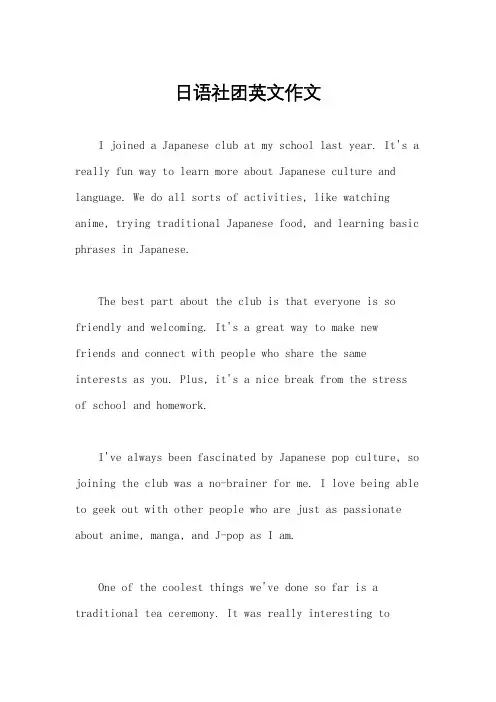
日语社团英文作文I joined a Japanese club at my school last year. It's a really fun way to learn more about Japanese culture and language. We do all sorts of activities, like watching anime, trying traditional Japanese food, and learning basic phrases in Japanese.The best part about the club is that everyone is so friendly and welcoming. It's a great way to make newfriends and connect with people who share the sameinterests as you. Plus, it's a nice break from the stress of school and homework.I've always been fascinated by Japanese pop culture, so joining the club was a no-brainer for me. I love being able to geek out with other people who are just as passionate about anime, manga, and J-pop as I am.One of the coolest things we've done so far is a traditional tea ceremony. It was really interesting tolearn about the history and significance behind the ceremony, and it made me appreciate Japanese culture even more.I also really enjoy practicing speaking Japanese with other club members. It's a great way to improve my language skills in a casual and supportive environment. Plus, it's a lot more fun than studying alone with a textbook.Overall, joining the Japanese club has been an amazing experience. I've learned so much and made some greatfriends along the way. I can't wait to see what other fun activities and events the club has in store for us in the future.。
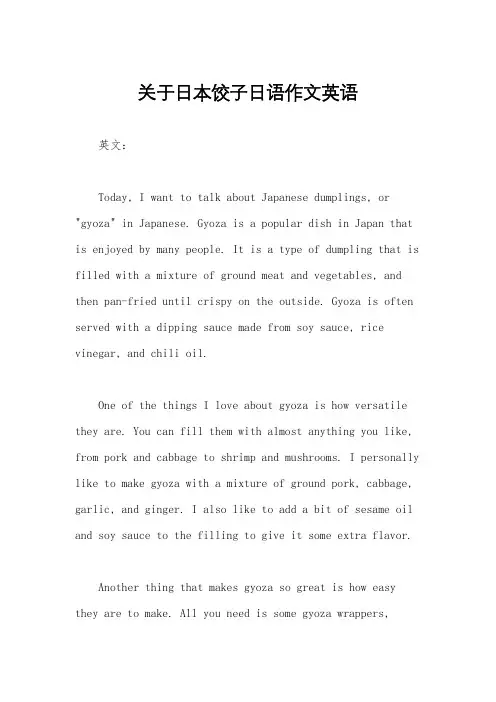
关于日本饺子日语作文英语英文:Today, I want to talk about Japanese dumplings, or "gyoza" in Japanese. Gyoza is a popular dish in Japan that is enjoyed by many people. It is a type of dumpling that is filled with a mixture of ground meat and vegetables, and then pan-fried until crispy on the outside. Gyoza is often served with a dipping sauce made from soy sauce, rice vinegar, and chili oil.One of the things I love about gyoza is how versatile they are. You can fill them with almost anything you like, from pork and cabbage to shrimp and mushrooms. I personally like to make gyoza with a mixture of ground pork, cabbage, garlic, and ginger. I also like to add a bit of sesame oil and soy sauce to the filling to give it some extra flavor.Another thing that makes gyoza so great is how easy they are to make. All you need is some gyoza wrappers,which you can find at most Asian grocery stores, and a filling of your choice. Simply place a small amount of filling in the center of each wrapper, fold the wrapper in half, and then crimp the edges together to seal the dumpling. Then, pan-fry the gyoza until they are crispy and golden brown.Overall, gyoza is a delicious and easy-to-make dishthat is perfect for any occasion. Whether you're lookingfor a quick and easy snack or a crowd-pleasing appetizer, gyoza is sure to satisfy.中文:今天,我想谈谈日本饺子,或者用日语说是“餃子”。
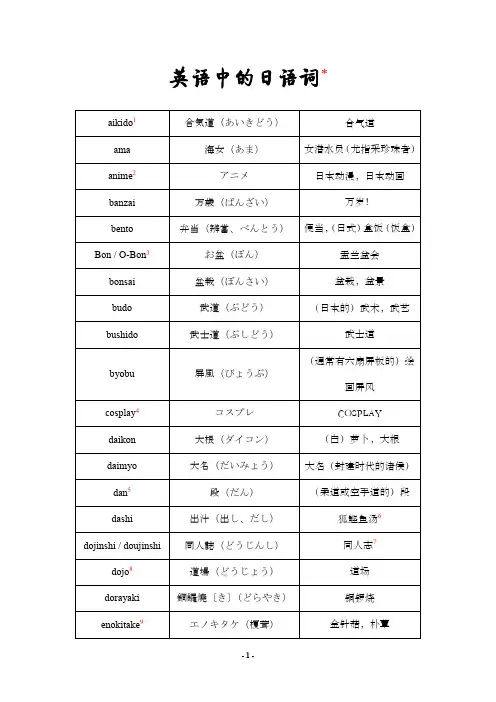
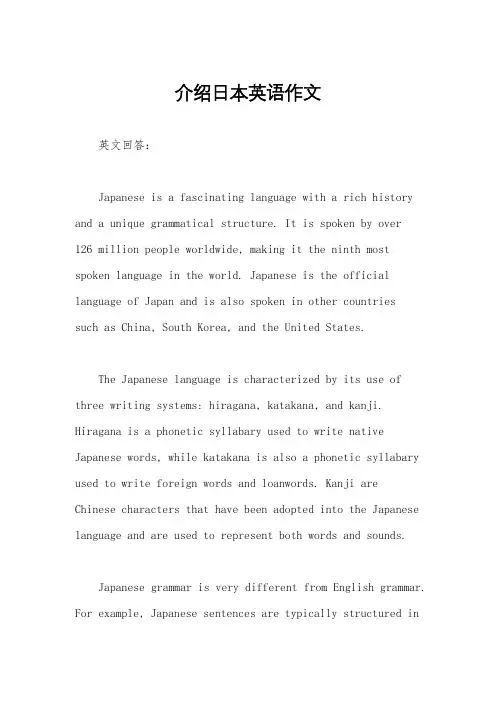
介绍日本英语作文英文回答:Japanese is a fascinating language with a rich history and a unique grammatical structure. It is spoken by over126 million people worldwide, making it the ninth most spoken language in the world. Japanese is the official language of Japan and is also spoken in other countriessuch as China, South Korea, and the United States.The Japanese language is characterized by its use of three writing systems: hiragana, katakana, and kanji. Hiragana is a phonetic syllabary used to write native Japanese words, while katakana is also a phonetic syllabary used to write foreign words and loanwords. Kanji are Chinese characters that have been adopted into the Japanese language and are used to represent both words and sounds.Japanese grammar is very different from English grammar. For example, Japanese sentences are typically structured ina subject-object-verb order, and adjectives come before nouns. Japanese also has a complex system of particles that are used to indicate the grammatical function of words in a sentence.Despite its difficulty, Japanese is a beautiful and expressive language. It is a language that is rich inhistory and culture, and it is a valuable tool for understanding Japanese society and culture.中文回答:日语是一种迷人的语言,具有悠久的历史和独特的语法结构。
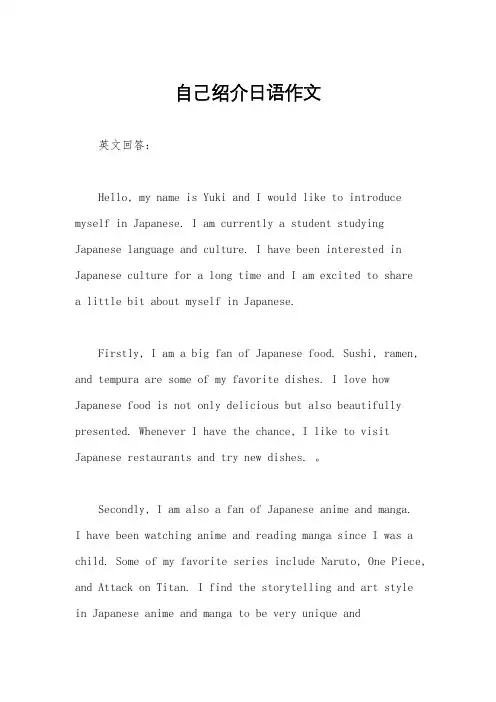
自己绍介日语作文英文回答:Hello, my name is Yuki and I would like to introduce myself in Japanese. I am currently a student studying Japanese language and culture. I have been interested in Japanese culture for a long time and I am excited to sharea little bit about myself in Japanese.Firstly, I am a big fan of Japanese food. Sushi, ramen, and tempura are some of my favorite dishes. I love how Japanese food is not only delicious but also beautifully presented. Whenever I have the chance, I like to visit Japanese restaurants and try new dishes. 。
Secondly, I am also a fan of Japanese anime and manga.I have been watching anime and reading manga since I was a child. Some of my favorite series include Naruto, One Piece, and Attack on Titan. I find the storytelling and art stylein Japanese anime and manga to be very unique andcaptivating.Lastly, I have been learning Japanese for a few years now and I have had the opportunity to visit Japan. I love the country's rich history and traditions, as well as the modern and bustling cities. I hope to continue improving my Japanese language skills and deepen my understanding of Japanese culture.中文回答:你好,我叫Yuki,我想用日语来介绍一下自己。
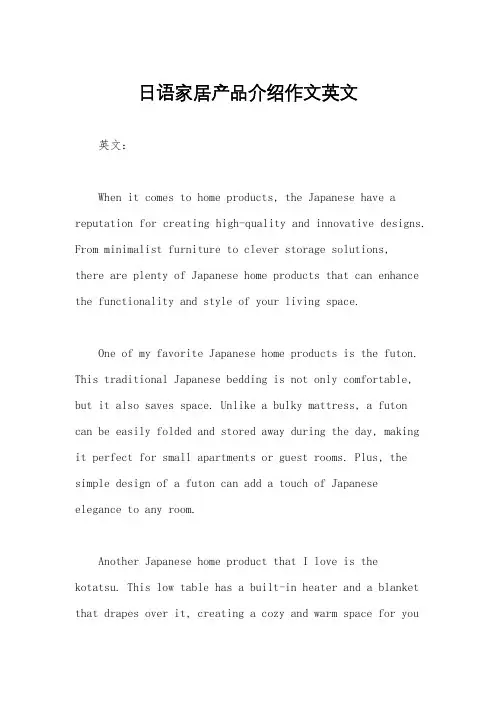
日语家居产品介绍作文英文英文:When it comes to home products, the Japanese have a reputation for creating high-quality and innovative designs. From minimalist furniture to clever storage solutions,there are plenty of Japanese home products that can enhance the functionality and style of your living space.One of my favorite Japanese home products is the futon. This traditional Japanese bedding is not only comfortable, but it also saves space. Unlike a bulky mattress, a futon can be easily folded and stored away during the day, making it perfect for small apartments or guest rooms. Plus, the simple design of a futon can add a touch of Japanese elegance to any room.Another Japanese home product that I love is the kotatsu. This low table has a built-in heater and a blanket that drapes over it, creating a cozy and warm space for youto relax in during the colder months. It's perfect for snuggling up with a book or enjoying a hot cup of tea.In terms of kitchen products, the Japanese have some of the best. For example, the rice cooker is a staple in many Japanese homes. It not only cooks rice to perfection, butit can also be used to make other dishes like soups and stews. And let's not forget about the bento box, which is a stylish and practical way to pack your lunch.Overall, Japanese home products are known for their functionality, simplicity, and elegance. By incorporating these products into your home, you can create a space that is both stylish and practical.中文:说到家居产品,日本人以创造高质量和创新设计而闻名。
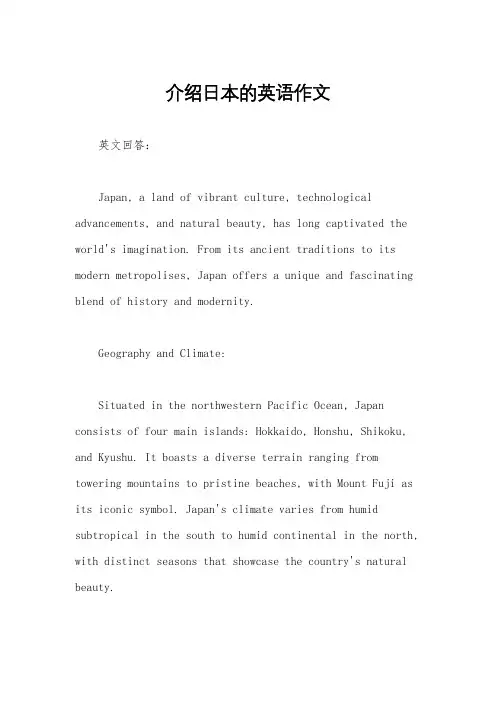
介绍日本的英语作文英文回答:Japan, a land of vibrant culture, technological advancements, and natural beauty, has long captivated the world's imagination. From its ancient traditions to its modern metropolises, Japan offers a unique and fascinating blend of history and modernity.Geography and Climate:Situated in the northwestern Pacific Ocean, Japan consists of four main islands: Hokkaido, Honshu, Shikoku, and Kyushu. It boasts a diverse terrain ranging from towering mountains to pristine beaches, with Mount Fuji as its iconic symbol. Japan's climate varies from humid subtropical in the south to humid continental in the north, with distinct seasons that showcase the country's natural beauty.History and Culture:Japan has a rich and storied history dating back to prehistoric times. From the feudal era to the Meiji Restoration, the country has undergone significant transformations. Japanese culture is deeply influenced by its ancient traditions, including Shintoism, Buddhism, and Confucianism. This reverence for tradition is evident in the country's festivals, arts, and daily life.Language and Education:The official language of Japan is Japanese, a complex and nuanced language with a unique writing system. English is widely spoken in major cities and tourist areas, but fluency is not common among the general population. Japan's education system is renowned for its rigor and emphasis on academic excellence, with students consistently ranking among the top performers in international assessments.Technology and Infrastructure:Japan is a global leader in technological innovation, with cutting-edge advancements in robotics, electronics, and transportation. The country boasts a highly developed transportation network, including bullet trains that connect major cities at incredible speeds. Japan's infrastructure is highly advanced, providing convenient and efficient access to utilities, services, and public spaces.Economy and Industry:Japan is the world's third-largest economy, with a strong manufacturing sector and a vibrant service industry. The country is home to global giants such as Toyota, Honda, and Sony. Japan's economy is highly export-oriented, with a focus on high-value goods like electronics, vehicles, and machinery.Tourism and Travel:Japan offers an unforgettable tourist experience, with a wealth of natural attractions, cultural landmarks, and modern amenities. From the bustling streets of Tokyo to theserene temples of Kyoto, Japan caters to every traveler's interest. The country's efficient transportation system makes it easy to explore its diverse regions and cultural sites.People and Society:The Japanese people are known for their politeness, hospitality, and respect for tradition. Japanese society places great importance on community and social harmony. While Japan has a modern and rapidly changing society, it also cherishes its ancient traditions, creating a harmonious fusion of old and new.Challenges and Future:Like all countries, Japan faces its share of challenges. These include an aging population, a shrinking workforce, and the need to balance economic growth with environmental protection. However, Japan's resilience and adaptability have historically allowed it to overcome obstacles andforge a path toward a prosperous and sustainable future.中文回答:日本概况。
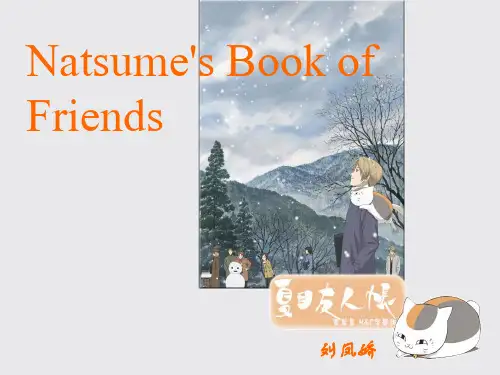
明天世界末日日语作文英文英文:As I wake up to the news that tomorrow is the end of the world, I can't help but feel a mix of emotions. On one hand, I feel a sense of panic and fear, knowing that everything I've ever known and loved will soon come to an end. On the other hand, I feel a strange sense of calm and acceptance, knowing that there's nothing I can do to change the inevitable.I remember a saying my grandmother used to tell me, "When life gives you lemons, make lemonade." It's a reminder to make the best of a bad situation, to find the silver lining in even the darkest of times. So, as I prepare for the end of the world, I try to focus on the things that bring me joy and comfort. I spend time with my loved ones, savoring every moment and creating memoriesthat will last a lifetime.I also find solace in the beauty of nature. I take a walk in the park, admiring the colors of the autumn leaves and the peacefulness of the world around me. It's moments like these that make me realize the preciousness of life, and the importance of cherishing every moment we have.As the day comes to a close, I find myself reflectingon the things that truly matter. Material possessions and worldly achievements fade into insignificance, and whattruly matters is the love and connections we have with others. I reach out to friends and family, expressing my gratitude and love for them, knowing that these moments of connection are what will truly last beyond the end of the world.中文:当我醒来得知明天将是世界末日的消息时,我情绪复杂。
治愈电影日语作文英文英文:Curing movies are a type of film that can make people feel better and more positive. These movies often have uplifting and inspiring storylines that can help people overcome their own struggles and challenges. Some popular examples of curing movies in Japanese cinema include "Departures" and "The Wind Rises."In my opinion, curing movies are important because they can provide a sense of hope and optimism, especially during difficult times. For example, when I was going through a tough period in my life, I watched the movie "The Pursuit of Happyness," which is based on a true story about a man who overcomes homelessness and poverty to become a successful businessman. This movie inspired me to keep pushing forward and never give up on my dreams.Another reason why curing movies are valuable is thatthey can help people connect with others on an emotional level. When we watch a movie that resonates with us, wefeel like we are not alone in our struggles and that others have gone through similar experiences. This can be very comforting and reassuring, especially for people who feel isolated or misunderstood.Overall, I believe that curing movies have the power to heal and uplift people in ways that other types of films cannot. They offer a sense of hope, inspiration, and connection that can be incredibly valuable, especially during challenging times.中文:治愈电影是一种能让人感觉更好、更积极的电影类型。
日语作文竖版英文格式模板Introduction。
In recent years, there has been a growing interest in the Japanese language and culture around the world. Many people are drawn to the unique aspects of Japanese culture, such as its rich history, traditional arts, and modern pop culture. As a result, learning Japanese has become a popular pursuit for people of all ages and backgrounds. In this article, we will explore the reasons why learning Japanese is valuable and discuss the benefits of studying the language.Reasons for Learning Japanese。
There are several compelling reasons to learn Japanese. One of the most obvious reasons is the practicality of the language. Japan is a major economic power and a key player in the global market. Therefore, being able to speak Japanese can open up a wide range of career opportunitiesin fields such as business, technology, and tourism. Additionally, Japan is a popular destination for travelers, and knowing the language can greatly enhance the travel experience.Another reason to learn Japanese is the rich cultural heritage of the country. Japanese literature, art, and philosophy have had a profound influence on the world, and being able to access these works in their original language can provide a deeper understanding and appreciation of Japanese culture. Furthermore, many traditional Japanese arts, such as tea ceremony, calligraphy, and martial arts, are best learned through the medium of the Japanese language.Benefits of Studying Japanese。
旅游日语的英文作文英文:Traveling is one of my favorite things to do. I love exploring new places, trying new foods, and meeting new people. It's always a great opportunity to learn about different cultures and ways of life.One of my most memorable trips was when I went to Japan. The country has a rich history and culture, and I was fascinated by everything I saw and experienced. From the bustling streets of Tokyo to the serene temples in Kyoto, there was always something new and exciting to discover.One thing that stood out to me was the hospitality of the Japanese people. They were always willing to help and make sure I had a good experience. For example, when I was lost in a train station, a kind stranger went out of their way to guide me to my destination.Another thing I loved about Japan was the food. I tried so many delicious dishes, from sushi to ramen to takoyaki.It was also interesting to see the different food customs, like how to properly eat soba noodles or how to pour sake.Overall, my trip to Japan was unforgettable. I learned so much about the country and its people, and I can't waitto go back and explore even more.中文:旅行是我最喜欢的事情之一。
掌握日语语法英文作文英文:When it comes to mastering Japanese grammar, there are a few key things to keep in mind. First of all, it's important to understand the basic sentence structure, which is subject-object-verb. This means that the subject comes first, followed by the object, and then the verb. For example, "I eat sushi" would be "watashi wa sushi o tabemasu" in Japanese.Another important aspect of Japanese grammar is the use of particles. These are small words that are added to the end of a word to indicate its function in the sentence. For example, the particle "wa" is used to indicate the subject of the sentence, while "o" is used to indicate the object. So in the example above, "watashi wa" indicates that "I" is the subject, while "sushi o" indicates that "sushi" is the object.One thing that can be tricky for English speakers is the use of verb conjugation in Japanese. Unlike in English, where the verb stays the same regardless of who is doing the action, Japanese verbs change depending on the tense and the level of politeness. For example, "taberu" is the plain form of the verb "to eat," while "tabemasu" is the polite form.Finally, it's important to remember that Japanese grammar can be quite flexible. While the basic sentence structure is subject-object-verb, it's possible to rearrange the sentence for emphasis or to convey a particular nuance. For example, "sushi o watashi wa tabemasu" would still be grammatically correct, but it would emphasize the fact that "I" am the one eating the sushi.中文:要掌握日语语法,有几个关键点需要记住。